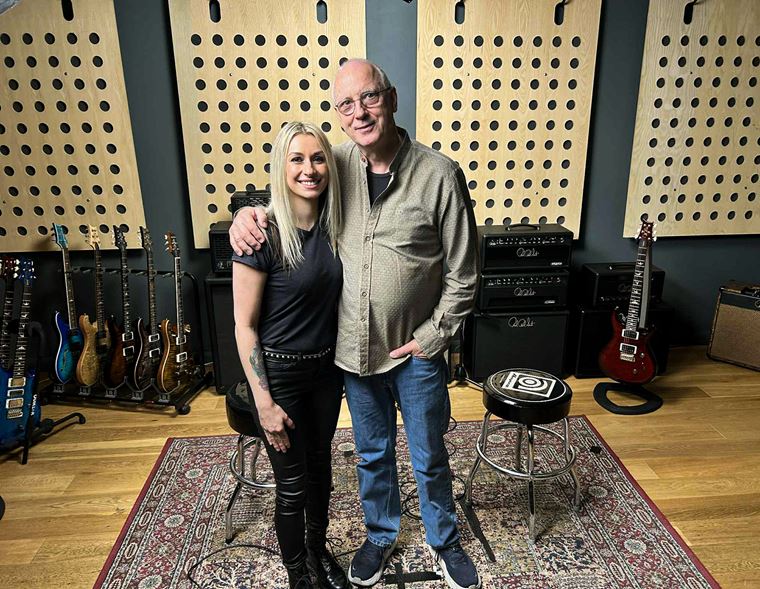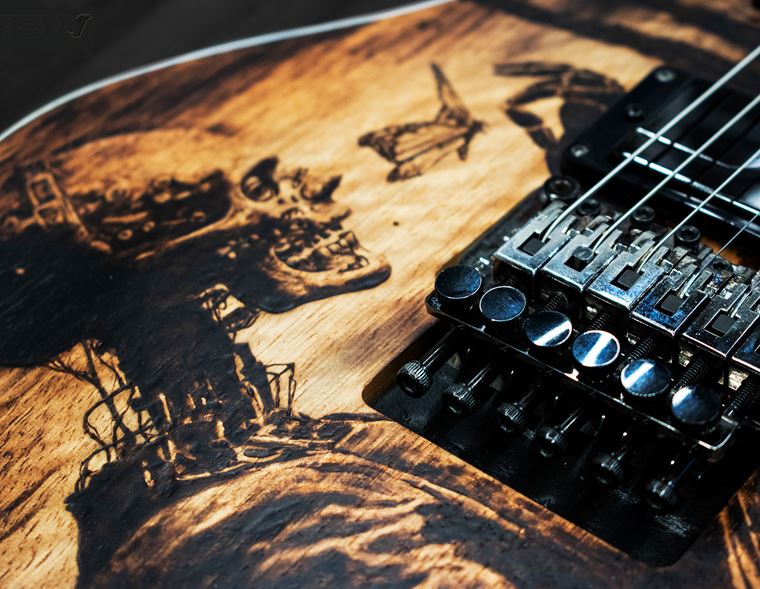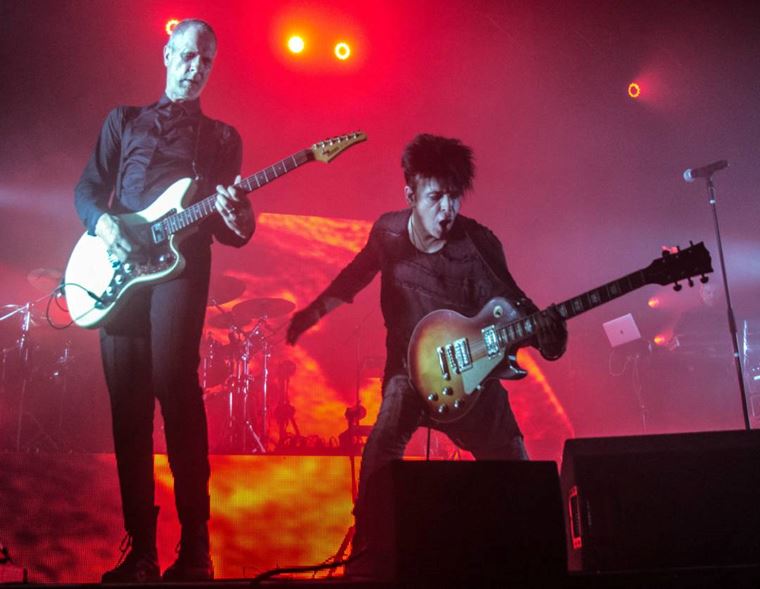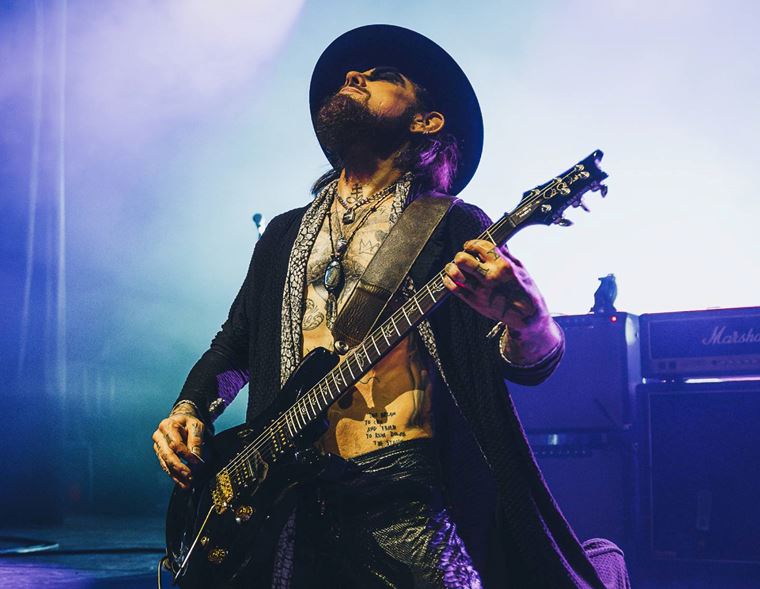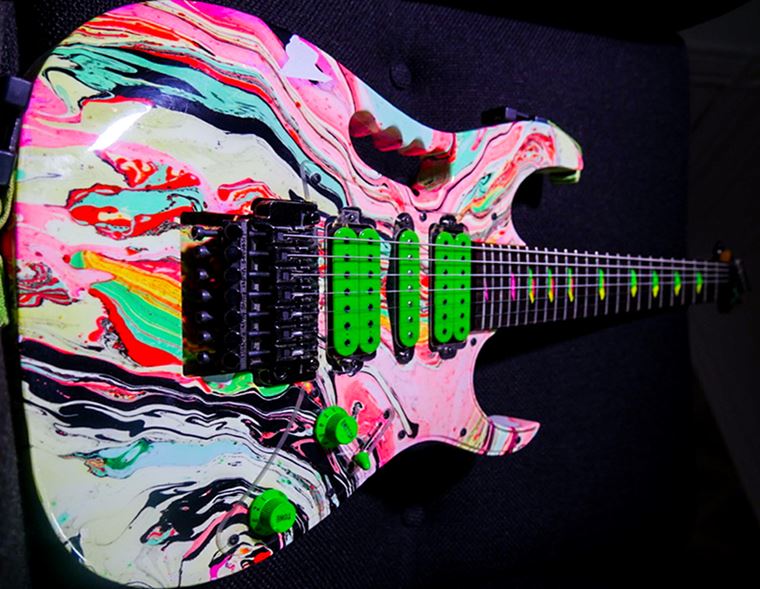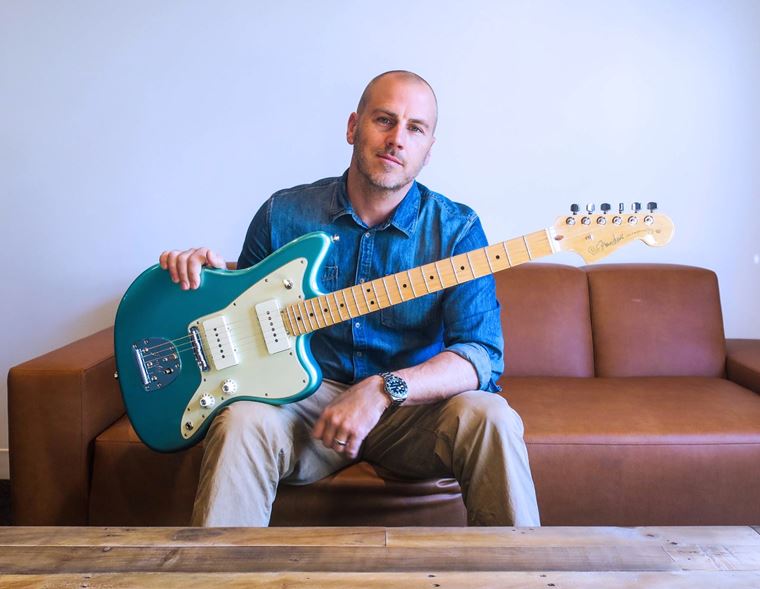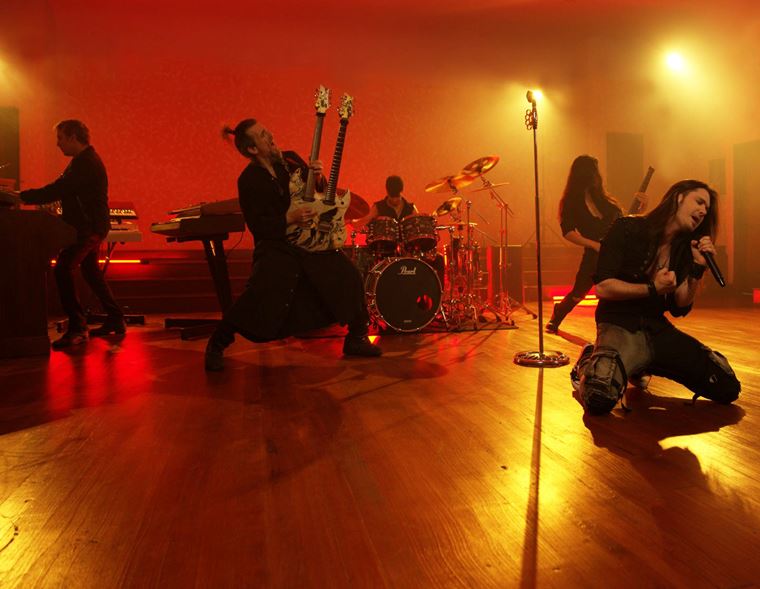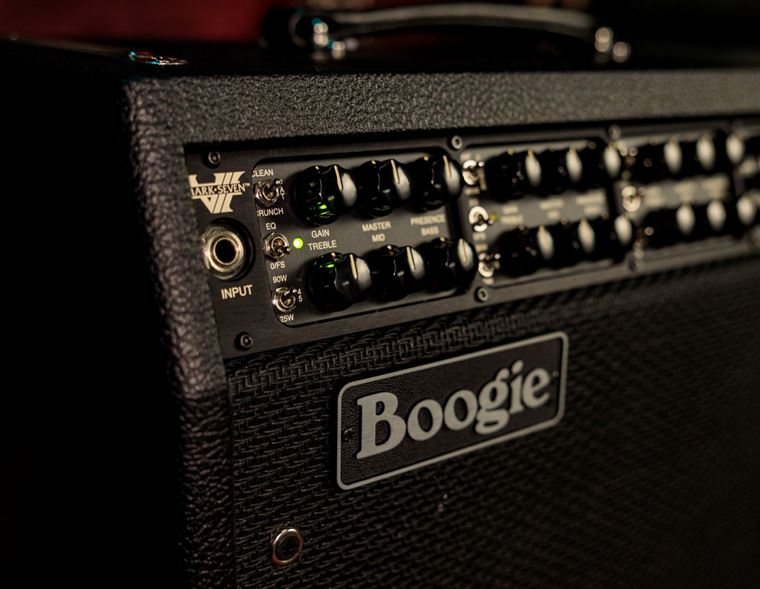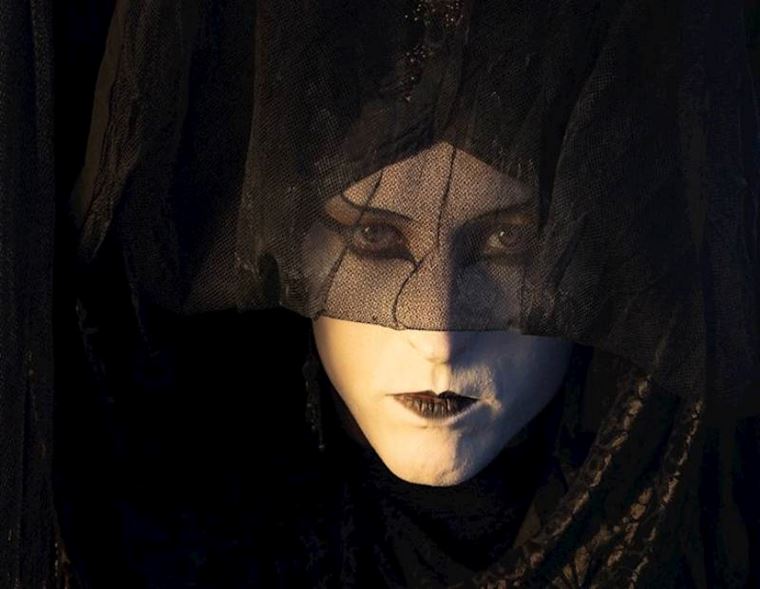AUTHOR & PUNISHER Exclusive Interview! Kruller, Sci-fi and Manufacturing Sonic Weapons
It has been a few years since we last spoke to our favourite apocalyptic prophet, Author & Punisher (see our previous Author & Punisher interview here). During that time, the world as we know it has weathered many changes, and nobody has a more appropriate sound to sum it up than he does.
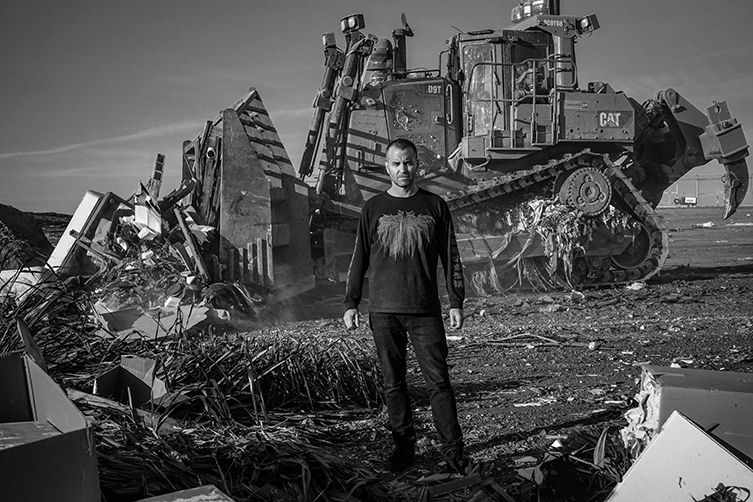
(Photo: Becky DiGiglio)
Tristan Shone is a one-man army of futuristic, nihilistic sonic warfare, a man who builds his own triggering devices out of machined steel and wire and feeds them into custom made cabinets for maximum effect. He’s an inferno of sound, twisting tortured synths and jackhammer drum sounds from his self-made, self-operated rig. His is the sound of a hostile, hellish future spilling over into the here and now.
Well, that’s how he is on stage, anyway. Offstage, he’s a laid back, friendly guy: a mechanical engineer, rave culture veteran and fan of doom metal who brings all of those worlds into gleeful collision with his music. Author & Punisher may be huge and austere sounding, but Tristan is a pretty chill guy, who is happy to chat about all kinds of subjects, as we found during a recent Zoom call to his home in San Diego. We virtually met up to talk about his new record, Krüller, which contains not only some clean melodic vocals but also guitar parts for the first time in over a decade on an A&P release. There’s also some high profile guest artists onboard, including Tool’s Danny Carey and Justin Chancellor.
We discuss all of these things in our exclusive interview below, as well as such subjects as cross-country drives, the important of in-ear monitor mixes and an unexpected dub reggae influence, not to mention the heaviest Portishead cover ever...
Author & Punisher Interview
guitarguitar: So, before we begin about your new record, am I pronouncing it correctly? ‘Krooler’?
Tristan Shone: Yeah! You know, it’s kinda a creation of my own. I don’t wanna get into it too much, but there’s a bit of a mystery there which I think is kinda some fun, New England -where I’m from – local lore, so I’ll just kinda leave them on up there for some people! When we were coming up with the themes for the album, there was this placeholder name for a while, and when it got to picking the album name from the song titles, we sorta stuck with this somewhat nonsense word to follow the themes of the world I’d created within the album.
GG: Okay, cool! Also, you change the spelling and it’s ‘crueller’; something that’s more cruel, haha!
TS: Yeah, exactly!
GG: So Krüller has the sound that – for want of a better expression – I’d expect from an Author & Punisher record, but on top of that there’s this extra ethereal and epic layer. Would I be on the right page with that?
TS: Yeah, absolutely! This was the record I feel like I’ve wanted to make for a long time. Also, because of the pandemic and its unique situation, I was able to basically have the confidence to mix the record myself. We have a studio attached to my practice space that’s a community studio. I can use it as much as I want, so it was pretty much like two or three months of mixing, you know? Going in with Jason Begin (also known as) Vytear, and Phil Sgrosso, who did the guitars, the three of us really nailed down the sound that I wanted to have for a long time. Wide, low and the low end, the main synth tone, is something I’ve wanted for a while: really wide, heavy and bassy. And then just filling up all the space with synths and guitars.
A lot of times on an album cycle, it’s like: ‘alright, you got four months to get your album done’. This time? At the beginning, it was like, ‘let’s get this done by fall’, and this was in May 2020. Then from the pandemic, we knew that wasn’t gonna happen, so then we just started to really dig in, you know?
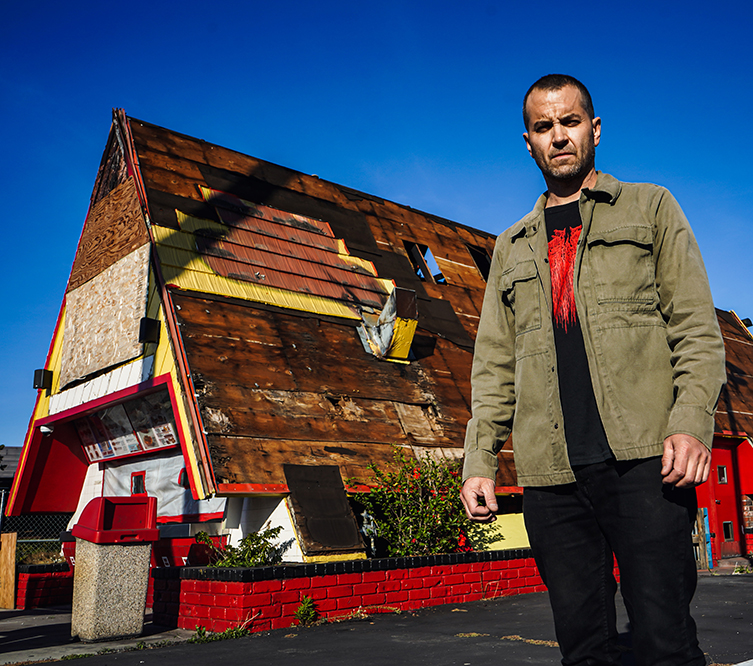
(Photo: Becky DiGiglio)
GG: With that time being the longest writing process you’ve had available to you, albeit imposed, how did that affect your songwriting process, or even your decision making?
TS: Well, the thing that really changed for me was coming back from that tour and having recorded every show. I’m talking about the tour with Tool, playing in the arenas with big sound systems. I actually had a crew of people that I brought along, and I was able to record all that and really listen to it in an honest way. Those were the best possible conditions to play my music in, you know? If I can’t do it right here, when am I gonna do it right? So, I listened, and there were some things I liked and also some things that I thought I could improve on. I was acting as a listener, not as a performer, and so it was like ‘that sounds good, that doesn’t sound too good; that song goes on for too long’. I guess it’s as close as I can get to making sort of concessions to the fan. It was kinda tough, I was swallowing my pride a little and acknowledging that some of the things that I really thought worked, didn’t work live. I tried to avoid some of those habits that I get into on albums. Also, bringing Phil and Jason in to really be producers on the record, essentially, with me, and like bounding ideas off.
GG: You mentioned earlier about the bottom end of your signature sound. It’s such a defining part of your sound, and back when I first heard you, you were using Elektron synths for those sounds. Is there new hardware or plugins happening on the new record?
TS: Well, you can stop me, depending on how deep you want me to get, but the stuff that I play live is my drums in my right hand. Now, I do have some sequenced drums that are really fast, stuff that’s too fast for me to play live. I don’t have a ton of that, but there is some of it. I’ve learned to play the main kick, snare and cymbals along with it.
"Movie stars are going to Berghain now, taking TikToks of themselves in line or whatever. It's a bummer."
The same goes for some of the synths: the high synths and some sequenced bits that Jason/Vytear would’ve made, these textures. I have a guitar player now, so he will tour with me. I’m not gonna sequence any of that. People would know: ‘Where’s your guitar player?’ But then the low end, the main riffs, that’s what I write. When I’m sitting in the studio and I’m coming up with the track, I’m playing the drums and the synth or the sliding stuff. That’s the main sound, you know?
GG: Yeah.
TS: I didn’t really change the kick and the snare that much, those are things that are more like, on song to song you may want a little more oomph on the low end, or use a little more reverb so the kick really lasts. You know, distortion or something, but I always make it very prominent. The kick is like, compared to a lot of other Doom bands I listen to, it’s funny how the kick isn’t really there. Their music is totally heavy, it works, it’s like maybe coming from more of a Drum n Bass background, the kick is always pounding through the sound system.
The low end synth, that tone is built up of: a sub, your basic sine wave sub oscillator; I’ve got a collection of different sawtooth oscillator synths that create this more kind of textured electronic synth tone that always has a lot of low end – that’s very stereo, so I don’t try to keep it mono; and then I also have two, sometimes more, ‘guitar’ tones. If I’m in Europe and I’m flying over there and don’t wanna bring a lot of backline, I won’t run those out into cabinets from my rig, I’ll just use like a Neural DSP kinda plugin. If you have a good sound system, I feel like I can simulate it pretty well, because it’s not my whole tone, it’s just kinda like a guitar texture on the top of my tone. I can get away with the digitisation, and now that I have a guitar player who is gonna be playing through a cabinet, he’ll have that sort of guitar room tone. When I hit one key: that’s what you hear, you know?
GG: Sure, sure! It’s mighty.
TS: I’m trying to get it so that I don’t need to bring all of these cabinets and Ampeg stacks with me. I mean, it’s rough out there right now so I’m adjusting my rig to the pandemic. It was almost like solving a problem, like, can I make this shit sound just as heavy through a PA system without bringing a thousand speakers? Because, if I’m gonna fly into a place and budgets aren’t what they used to be, and turnout is I guess 40% lower? So it’s like that.
GG: It’s an issue, especially when it’s often the ‘illusion of heaviness’ that’s the effective thing, as opposed to actual heaviness. When I listen to Author & Punisher at a low volume on my little speaker, it still sounds huge because it’s the illusion of hugeness. But, when I go and see a performance of yours, it needs to be actually huge and it needs to hit me! That’s the difference, isn’t it?
TS: Yeah, and now we have to make our songs sound good on a phone, without any speakers, so you have to have heaviness on both of those sides, that’s a really good point. I don’t think anyone’s brought that up. Yeah, so when you’re mixing, you’re mixing on the speakers but then you’ve just gotta unplug the interface and listen on the laptop speakers. Then you’re like, ‘Where did it go?’ (laughs) Is the kick still there? The kick has to have that (punches hand) thwap that sounds like bass even though it’s not.
"I basically had 27 tracks of Danny Carey that I could put into the mix, so that was cool!"
GG: Well, it’s all about those sci-fi textures that are making the music so effective. When we did our last interview, I remember presuming that you must’ve been into stuff like Terminator and Tetsuo and you were like, ‘No, not really’! Your music, to me, sounds like it’s from this doom-laden future, haha! So that isn’t necessarily the case, but when I was reading the press release, you mentioned that there was some stuff about Octavia Butler and that type of thing: realistic dystopian fiction. Is that an easy reference point because it kinda sounds that way, or was that kinda of stuff part of your intended message?
TS: That’s definitely part of the message for the record. I know it’s kinda cliché: we are called Doom metal, so every band is like, ‘End of the world!’ and they write things on their sleeves like ‘There is no hope!’. How many times do we need to hear it? With this record, even with the colours of the album cover and the whole vibe, I’m trying to take a less cynical approach compared to Beastland, which I thought was ultimate darkness and cynicism.
There was also another book: N.K. Jemisin’s Broken Earth trilogy. That was more sci-fi but also sort of like a metaphor for...I dunno...I guess it was like slavery and colonialism in the US but it was put in this sci-fi world. That was in my mind while I was working on the album and so the lyrics, without copying her book, are inspired by those themes.
With Octavia Butler, that’s a much more realistic book. That was very painfully similar to where I felt like we were in the Summer of 2020. Just all these survivalists driving around in their trucks with their turrets and flags and gas tanks all on the side of their Sprinters and Tacomas. Very militaristic, like, dudes in the US walking around at protests, right wing people with guns at the side of protests for the Black Lives Matter thing. This still happens, although the protests aren’t as prevalent now, but that shit it crazy. So for me, I’m imagining this world where society breaks down and we have to somehow survive, and on the one hand you’ve got the people who are basically just gonna use force to survive, and on the other you’ve got the people who are artists and peaceful people, but they still need to survive, so we have to come up with our own means of doing that. The vehicle and the sort of imagery I’ve used for the album is very much based on the sort of...did you watch that show Station Eleven?
GG: No, but I read the book, actually.
TS: Ah, I hadn’t heard of the book at the time. I wanna read it now! The show came out recently, and that was more like the kind of world I’m trying to fantasize about. A little less violent, and you still get a little bit of style (laughs).
GG: It’s not quite as overtly ‘Mad Max’, although that’s maybe just over the horizon, haha.
TS: Yeah, it was trying to make it these other ways, like Octavia Butler’s book (Parable of the Sower), trying to find other ways to survive, using indigenous practices, surviving off the land rather than just hoarding all the oil and getting as many guns as we can. It’s such a sad vision for the future, but some people fantasize about that. I think they were very excited about that prospect of using all of the tactical gear that they have for a negative reason.
GG: Yeah, totally. Kinda unnerving. And you mentioned the artwork: it’s stunning, beautiful stuff, and do you know what it reminded me of? I don’t know if this resonates with you, but the artwork and indeed the subject matter you’ve just mentioned are very much like Arrakis, it’s very like Dune. Effectively invading a planet, stripping it of its assets and oppressing the indigenous people. It’s very timely of course, too, given that the film just came out a few months ago.
TS: Yeah, absolutely! It’s funny, we were watching that. I drove to my parents during the pandemic. They live alone on a farm so we drove all the way across the country from San Diego to New Hampshire and I listened to Dune as we were driving the whole time. Then we watched the movie when we got to my parents’, then we watched the other one. I hadn’t even thought that the big giant vehicle that they use to mine the spice is called a ‘crawler’.
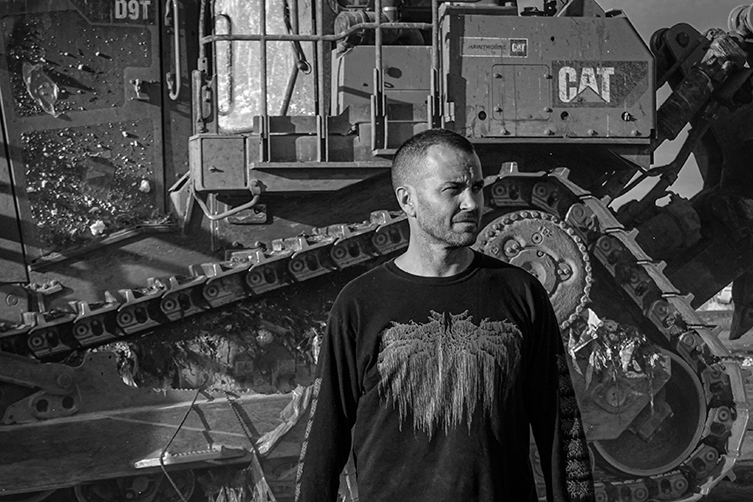
(Photo: Becky DiGiglio)
GG: Haha, yeah!
TS: My wife was like, ‘You stole that from Dune!’ I swear I did not steal it! If you knew where I got the word ‘Krüller’ from, you would know that I didn’t! (laughs) Anyway. But just subconsciously, these things happen, you know?
GG: Yeah, totally! It just shows that you’re in tune to some sort of zeitgeist, I suppose? It’s in the air, much like the spice, haha! So yeah, up until this record, I assumed that no Author & Punisher records had guitar on them, and that this was the first time. Is that correct?
TS: Let’s see...the last time I had guitar was on the Drone Machines record, so I haven’t had guitars for about eleven years. Up until then it was half machines, half guitar, and drum machine. So I try to go back and play some of those songs now with my guitar player, and first of all the vocal pitch range is like eleven years of drinking on tour and smoking weed or whatever! I’m barely able to hit it, you know? And I’m feeling pretty confident about doing vocals right now, but I just hadn’t even tried those songs. It was like, ‘Wow, that’s much higher!’ It’s gotten deeper as I’ve gotten older, I guess that just happens.
"I don't really come from an Industrial pedigree or anything. My thing was the rave and sound system culture from the UK."
GG: Yeah. The vocals is one of the main talking points on this record. There’s more melodic, clean singing this time round. Your ‘normal’ Author & Punisher singing voice is really powerful and raspy, super aggressive. It sounds really sore to do! Does that type of vocalisation come easy to you?
TS: Well yeah, it’s like the voice just kinda breaks up naturally. I remember singing with some bands earlier in life, and they were trying to scream, it was more like a yell. The only way they could get it to have any texture was with their throat. I just find that mine will break up. Then of course the bands that I’d listen to, I’d try to model my vocals, you don’t even realise it, it’s subconscious. Guys Scott Kelly (from Neurosis), the singer from Meshuggah, and Quicksand, those were the kinda voices that I really liked. Sometimes when I hear it, I’m like ‘Oh, I’m doing the Scott Kelly thing there!’, because I always loved his vocal style.
I don’t do much of the breakup thing on this album. It’s cleaner, but there are some moments. Basically, after the Tool tour, I was able to listen to Maynard’s in-ear mix a little bit. I use in-ear monitors, and because my music is so loud and heavy, I do use a click track sometimes, little things that will tell me when certain parts need to happen. It was still hard for me, on some melodic parts, to even hear where the pitch is, because I’ve got so many oscillators going, and the low end on the stage. Sometimes I’d be like, ‘Woah, I’m overwhelmed!’ So the monitor guys for Tool really helped me dial in my in-ear mix. They were super helpful: we got rid of all the low end in my in-ears, turned the volume down on certain things, shaved the volume and took the effects out of the vocals in my ears so that I’m hearing this really dry vocal.
From that point on, as long as I’m warmed up and not, y’know, hungover or super tired, I can really hit those pitches now. Screaming is a lot easier live: you don’t have to worry so much about hitting the pitches. You can scream in pitch but, I dunno, even that is hard so now I’m more confident. When I was walking around listening to the new songs in my ears, during my day at work, or on hikes and stuff, coming up with melodies, the melodies that came to me more naturally were not really heavy. They were just much more mellow. I was listening to a lot of dub and reggae during that time, and I think some of that rubbed off on me or something. I was not in the mood to be screaming.
GG: Cool, so the music you were creating was naturally suggesting those types of melodies?
TS: Yeah, and also because I feel that the stuff is very heavy and, I dunno, it was already heavy enough. Sometimes I feel like, when you hit those notes, you don’t need to have the vocals be heavy as well: it’s already heavy enough, you know? So when Phil was gonna add some guitar to that, he didn’t need to add so much on the low end. What we needed was these sort of connecting sounds, connecting these heavy fifths on the chords I was playing, putting them together in an organic way. I feel like that’s all the track needed: an organic element.
GG: Yeah, cool. You mentioned Tool of course, and two of those chaps show up as guests on the new album! That’s quite a coup! Was that one of those ones where you just became friends on tour and it led to these recordings? How did that work?
TS: Yeah, exactly! Danny (Carey, Tool drummer) and Justin (Chancellor, Tool bassist) shared a green room on tour. They’re buds, they are the ones that kinda stay up a little bit later, hang out and stuff. I got to know them, and Justin’s a Chelsea fan. I’m a Liverpool fan, so we got to watch some matches together during the tour. We kinda connected on that, and when we got back from touring we were just texting, like: ‘Hey, let’s do a track together?’. He had this new project called M.T. Void that was just announced. I was just, ‘Okay, I’m working in an album: do you wanna guest on one of the tracks?’ We started sending things back and forth. That’s the one track that I programmed, I didn’t really play in the studio. I was like, I wrote a beat, sent it to him, and we went back and forth.
Danny was a bit more like, I had this track that was just this pretty basic electronic beat. I thought maybe he could fill in the gaps, because I love his fills, you know?
GG: Big time.
TS: I sent it to him and instead of doing fills, he just played on the whole song! I basically had 27 tracks of Danny Carey that I could mix down and put into the mix, so that was cool.
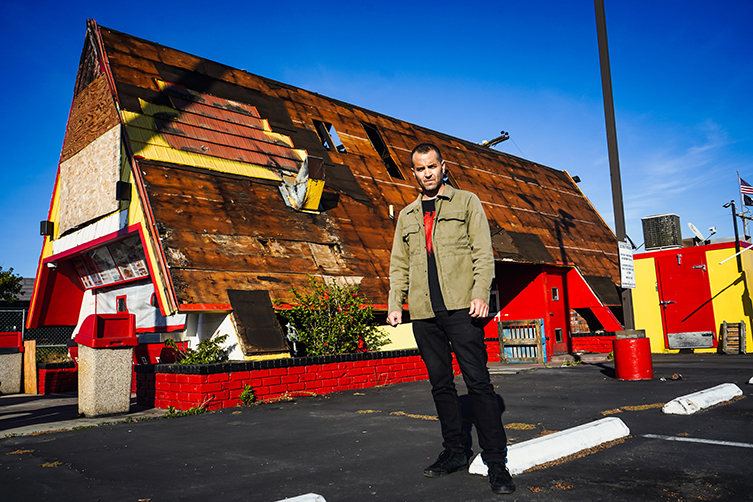
(Photo: Becky DiGiglio)
GG: That’s well cool! And in that sort of situation, after Danny delivers the tracks, does he have any more input after that? Can he have an opinion on how you’ve used his playing? I don’t know how that works!
TS: To tell you the truth, he had torn a muscle and so he wasn’t able to work on it. We had to deliver the album and he’d agreed to be on it, so he did just one take and sent it to me. It was perfect. I mean, he actually added so much to it that I sorta had to go in and...I mean, that’s what he wanted me to do: he gave me a ton of material for me to edit down to what I needed.
GG: You just carve out what you need.
TS: Yeah. It was one take!
GG: He’s a one-take Jake! I’m loving it. One of the big surprises on the record is the Portishead cover! Is that something you’ve been wanting to do for a long time?
TS: Yeah, I love Portishead. I feel like they’re kinda the Doom metal band of the sort of electronic, rave culture or whatever. Back in that day, they were the dreary goth band, so yeah. I love how understated that band is. There’s no fashion element, they just kinda get up there and do their thing and it’s so perfect.
I don’t really come from an industrial pedigree or anything: my thing was the rave and sound system culture of the UK. When I was in grad school at UCSG, there was this guy from London who were there. Basically, I was trying to figure out how to combine my art and my music with my engineering. He was building sound systems and was into all that UK drum n bass stuff that I was into, so he and I got some subwoofers and he showed me how to build all of that stuff. For me, if I’m gonna do covers, I’m not gonna do metal bands: I’ll do bands like Portishead. I feel like her vocal style is very similar to what I tried to achieve on this record. It’s like sort of light vocals and heavy low end.
"My low end tone is made up of a sub, a collection of different sawtooth synths and also two - sometimes more - 'guitar' tones. When I hit one key, that's what you hear."
GG: Yeah, I get what you’re saying, yeah. On paper, the association sounds unusual, but if you hear Portishead tunes like Machine Gun, there’s a crossover there. Also with a lot of other downtempo, trip-hop stuff like Tricky: his music sometimes approaches Industrial music, but then, ‘Industrial Music’ is ten different things to ten different people, right?
TS: Oh yeah! That is an industrial track for sure, Machine Gun. Yeah.
GG: Yeah! You touched on some interesting things there. Electronic music and rave culture got really shut down in the mid-nineties, with things like the Criminal Justice Act in the UK. It almost seems like that vein of the future – that whole emerging culture that was maybe more utopian, more egalitarian – got stopped in its tracks. It’s hard to say but I sometimes just feel that way. Does that make sense to you over in the US? We were both just a little bit too young to be involved but I still remember those feelings, of a culture – let’s say electronic hippies, for want of a better term – vanished.
TS: Yeah, well, I mean I was in college from ’92 to ’96 and my introduction into that sort of world happened then. The friends that were my room-mates were sort of into drum n bass, going down to New York City, going out to Brooklyn warehouses for raves and sound system stuff. It was a blast! Taking over warehouses in these areas that, yeah, just doesn’t happen anymore. In LA, vice basically clamped down on any party like that.
And yeah, you’re right: it was kinda like ‘support your own people’; there were kinda like squats there. We basically got taken over by capitalist society. They wanted to monetise that, so I’m sure the big clubs, promoters and everything just...yeah, there was a big Utopian thing for a while. I see it happening when you go to Berlin too, now. People started to want to make money on all of that now, and Kreuzberg and all. Movie stars are going to Berghain now, taking Tik Toks of themselves in line or whatever. It’s a fuckin’ bummer.
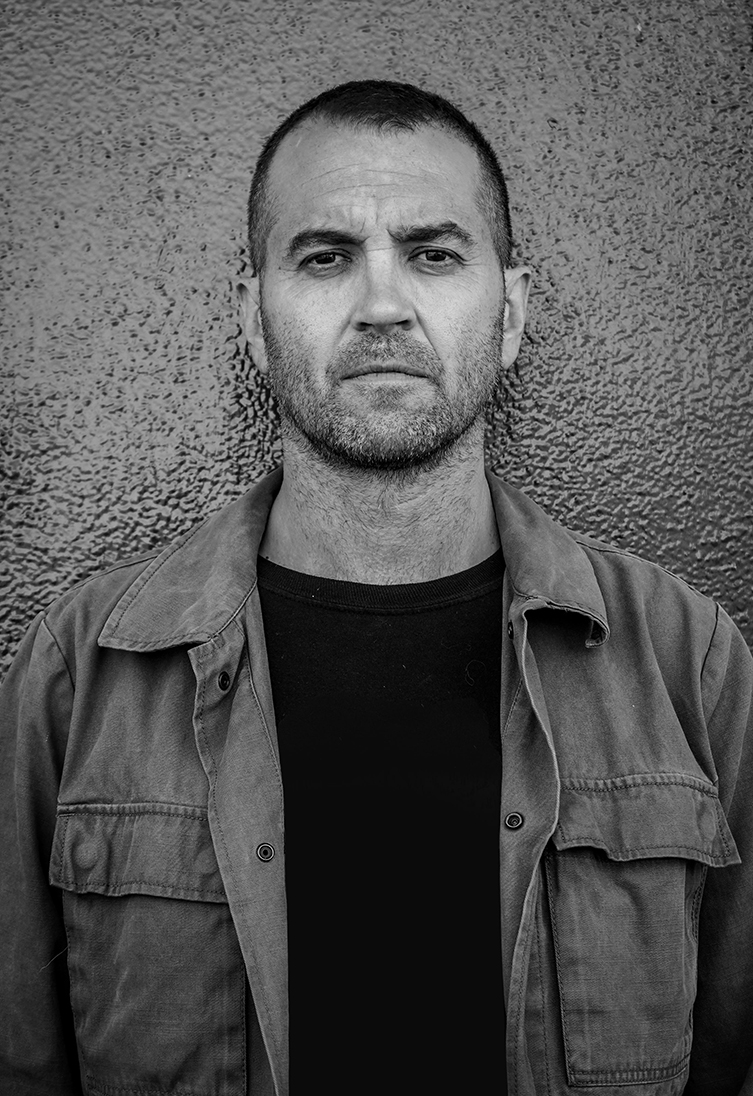
(Photo: Becky DiGiglio)
GG: It is, man! I hate to be someone who harps on about ‘authentic culture’ because that implies a position I neither have nor care about, but there is a point where culture expands and somehow becomes more basic. It’s not about being elitist, but it is about realising when something good becomes a profit/commodity situation and you sense the gangrene setting in, haha!
TS: Yeah! I understand that the locals that live in Berlin go party at nine in the morning, because most of the tourists will be drunk and gone! It’s a shame. Some interesting stuff might happen in the Midwest now. You’ve got cities that used to be...I’m talking like Des Moines, Kansas City, St Louis, Cincinnati and Dayton, Ohio: that place is full of warehouses from industrial America. I’m kind of curious that, now that people are getting priced out of places on the West Coast, New York and Chicago, people are starting to move to those cities because there’s opportunities to take those spaces. There are so many of these cities, you know? Although they are extremely ‘red’, conservative places, you’re gonna see progressive people moving there. There’s less regulations, and those buildings are cheap as fuck so hopefully there may be a rebirth there, to a certain degree.
GG: That’s really interesting, I hadn’t considered that at all! Yeah, people always look to the capitals for the culture centres, but yeah, we’re all being pushed sideways, aren’t we?
TS: Yeah, no money! It’s just so expensive to live in those places. But yeah, I’ll let you go on (laughs).
GG: I think we’ve nearly covered everything I wanted to ask you actually! So, just to tie it all up: the record’s out on Feb 11th and the UK tour is not happening right now, is that correct?
TS: Yeah, we’re just putting the press release together. It feels like a broken fucking record at this point but just, the EU dates already got cancelled by the promoters, and then I had these 8 UK dates, but then to fly into the UK with the van and everybody that I need to bring, and the risk of cases being the highest ever, I was just like: ‘Alright, we have to wait’. I feel really bad but we’ve started seeing other bands doing it and it’s just...anyway, I have a tour in March and April that doesn’t come to the UK, hopefully that’ll happen.
GG: Hopefully so, and maybe we’ll see you later on?
TS: Yeah! We’re gonna get a UK tour. Now that it’s a little more complicated to bring merch to the UK, we’ll probably just do a UK/Ireland tour, you know? We’ll do Scotland, England, Ireland and Wales. All of it.
GG: As long as we get you in Glasgow! Oh, one thing I forgot to ask you about was your company, Drone Machines! You’ve also been refining and changing your existing devices, too, I hear? If you’ve anything cool to tell me about that, I’ve love to hear it!
TS: I’ve wanted to do Drone Machines for a long time but I’ve held back because it’s a pain in the ass: I don’t know if I want to be a business owner, and also, to really make my instruments into a product: it’s just so much work. Then, to deal with customers...but we got to the point where I met Jason Begin, who produced this record. We got talking about ways to integrate what I do with modular synths, to really take it to the next level. We redesigned the interfaces so they’re a little more slick: my stuff’s pretty raw. So it’s still gonna be raw, hardcore materials but the electronics will all be completely open source, the parts you’ll be able to order online, you’ll be able to program, there will be an online forum where people can trade code, so all that stuff is hopefully going towards making these instruments that you will have for a very long time. Controllers that are very physical.
GG: Wow, that’s so exciting! Presumably you can MIDI map them to your Ableton settings or whatever?
TS: Yeah, that’s what I do just now. I’m an Ableton user, but I have used them with some Elektron gear because of the MIDI output, but yeah, we’ll have USB-C, MIDI, Ethernet. Eventually, we’d like them to have their own audio, like a synth engine.
GG: You mean like DSP?
TS: Yeah, eventually!
GG: That sounds wicked!
TS: We’re looking at little brick modules, for later on: the sub, the guitar tone, that kind of thing. They are basically copies of what I’ve done. The prototypes that I use now on tour will be what’s on offer. They’re intended to be in front of you, so people can see what you’re doing. From a performance perspective, it’s not just some black box that people see you doing stuff to. I was planning to have them ready to buy now but getting supplies is really slow. We’re hoping for Berlin in May at the Superbooth. I’ve got so many ideas, so we need to get two or three products out so we can get the ball rolling. It’s exciting!
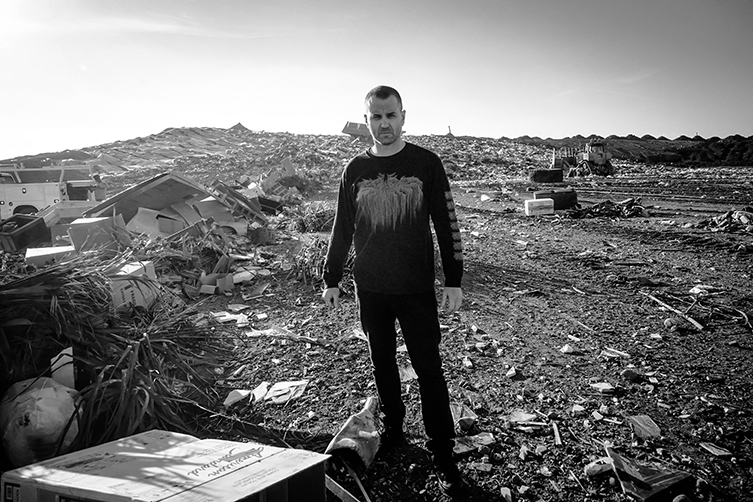
(Photo: Becky DiGiglio)
After that, we continued to talk about the Tool tour, and about some mutual friends that we share. Then, it was time for Tristan to continue his day in sunny San Diego and me to a ‘Glasgow January’. Looking back, we managed to cover a huge range of topics in our time, which is always the sign of an enjoyable conversation!
Author & Punisher’s new record, Krüller, is out on February 11th. It’s a fantastic listen, with scope, colour and atmosphere to accompany the vast size and crushing tones that you’d expect from this uncompromising artist. Career best? It’s hard to say, because if you like Tristan’s stuff, it’s all pretty ace, but this one may open his sound up to those who’d be otherwise hesitant about exploring such extreme sonic territory.
Author & Punisher will be touring Europe soon, and hopefully the UK sometime in the near future. Keep up with it all via the official Author & Punisher website, where you can also pre-order the record and get some quality merch.
Our thanks go out to Tristan for giving us his Friday morning, to James & Pip for putting us in touch, and as always, to you for reading our interview! Thanks for giving us your time! If you want more, please head over to our guitarguitar Interviews section, where you’ll find exclusive interviews with Nine Inch Nails, Ministry, 3Teeth and many more!


